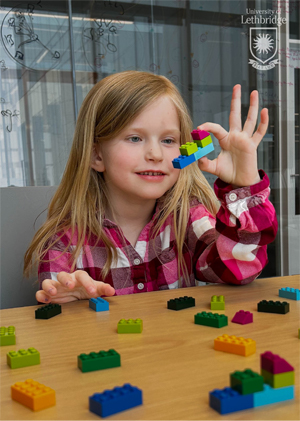Bilingualism could boost brain development for preemies


Children born pre-term are at higher risk of developing long-term health problems such as attention deficit hyperactivity disorder, autism, anxiety and depression.
But what if learning a second language from an early age could minimize these risks? There is growing evidence that bilingualism can enhance the social, emotional and cognitive skills that contribute to success in both school and life. Some researchers disagree, however, suggesting negative outcomes or no advantage at all.
A PhD student at the University of Lethbridge has launched an innovative project that could further bolster the case for bilingualism. Sally Sade is using simple, fun and interactive games to assess how three-to-five-year-olds who were born pre-term and/or at low-birth weight score on executive function. This is a catchall term for the mental flexibility, attention, and working memory that equips children when it comes to organizing thoughts and activities, completing tasks and controlling emotions and behaviour. Sade's hypothesis is that bilingual children will score higher on mental skills and cognitive processes than monolinguals.
According to the World Health Organization, about 15 million babies each year are born pre-term, typically with low birthweight, and the number of these children continues to rise. Implementing early interventions, when young brains are still developing, is critical to helping these children develop to their full potential.
In Sade's study, more than 60 bilingual and monolingual children from pre-schools and daycares in southern Alberta participated in a play-based activities like Lego block building, Red Light-Green Light and Simon Says. The 10 research-based games have been proven to measure and enhance executive function, including self-control, working memory and cognitive flexibility.
The curriculum, called Building Brains Together, was developed by Allonna Harker, MSc and Drs. Robbin Gibb and Claudia Gonzalez at the University of Lethbridge after a cross-Canada assessment of kindergarten readiness found that Alberta children fell below the Canadian average, with children in Lethbridge scoring below the Alberta average.
Sade collected baseline measures through initial testing with children before the curriculum was introduced both in the classroom and at home over a six-week to four-month period. The children were then tested again to see if bilingual children – especially preemies – experienced a faster improvement in their executive function than monolingual children.
"I predict that bilingual children born pre-term will score higher on tasks measuring executive function than monolinguals," says Sade, who received a Canada Graduate Scholarship grant from CIHR to carry out the research.
"What's good about this test," she adds, "is it is play-based and can be easily implemented into a daily routine at both school and home to build these skills in children."
Another unique aspect to the research is its focus on children who are fluid in both their first and second languages. Previous studies often categorized subjects as simply bilingual or not.
"But if someone is only 10% proficient in understanding and 20% efficient in being able to speak a language, that's going to impact their executive function differently than someone who is fluently bilingual," says Sade. "You need to look at where someone lies on the bilingualism spectrum."
Sade is currently analyzing data from the tests, with preliminary results suggesting that bilingual children develop social skills at a faster rate than monolingual children after playing the games. Bilingual children also appear to score higher on emotion control. She plans to publish the results of her research this fall.
"For the next phase of my research I will be including EEG (electroencephalogram) to look at the neuroactivity in young children and young adults," she says. "My goal is to build the evidence base for an easy-to-use tool that could help both educators and parents give preemies the best chance at life."
- Date modified: